Dentures – Burlington, MA
Invest in a Complete
Smile Today!
At our Burlington dental office, Dr. James Kostas can make your smile whole again with partials or dentures in Burlington. If you’re ready to improve your diet, your speech, and your confidence, replacing your missing teeth can do all that! No matter why your teeth are missing, if you’re looking for an affordable way to rebuild your smile, we can fit you for either a partial or full set of dentures so you can start living your best life. Contact us today to find out what you can do to take the next step toward a healthier, complete smile with dentures and partials in Burlington, MA.
Why Choose Complete Dental Care for Dentures & Partials?
- In-House Implant Placement and Restoration
- State of the Art Materials and Technology
- Multiple Flexible Financing Options
Who’s a Good Candidate for Dentures?

Scheduling a consultation with Dr. Kostas is the first step on your journey toward a new smile. He will examine your smile in its entirety and recommend the appropriate method of treatment. It is necessary that he ensure you have good gum health, jawbone density, and are missing multiple or all your teeth along a row. His experience and knowledge will allow him to provide a high-quality prosthetic that comfortably fits your smile, looks natural, and offers a chance to embrace a better quality of life. To find out if dentures are right for you, continue reading or make an appointment with our team today!
Effects of Missing Teeth

First and foremost, it’s important to understand what causes missing teeth and what can happen if you fail to replace them. According to the American College of Prosthodontists, the most common ones include tooth decay, gum disease, injury, and poor oral hygiene habits. However, there are certain systemic conditions that can also lead to multiple missing teeth.
It’s incredibly important to replace the gaps in your smile. Otherwise, you could experience several negative consequences. For example, your natural teeth can move positions to fill an empty space, your jawbone may begin to deteriorate, and your gums may start receding as well. Some other effects are facial sagging, difficulty speaking, trouble eating, and lower self-esteem.
What Qualifies You for Dentures?

Truthfully, almost anyone suffering from tooth loss can get dentures in Burlington. This method of tooth replacement is a great option for patients experiencing significant tooth loss, have sensitive teeth, or decay. Of course, you must also have sufficient healthy gum tissue and jawbone to ensure successful treatment.
Keep in mind that the number of teeth you’re missing can also determine which type of denture you get. There are many different ones to choose from, including full dentures, partial dentures, implant dentures, and immediate dentures. Since dentures are typically more cost-effective than other solutions, they’re a great choice for patients on a budget.
Alternative Tooth-Replacement Options

Not a good candidate for dentures? Don’t worry – you have other options to explore! Some of those include:
- Dental Bridges: Are you only missing one or a few teeth? If so, dental bridges may be the right option for you! All you need to have is healthy teeth surrounding the gap in your smile to support the bridge.
- Dental Implants: If you want a more stable solution, you can opt for dental implants! Each titanium post is surgically inserted into the jawbone, replacing the entire structure of missing teeth from the root up to the chewing surface. You must have adequate jawbone density to be eligible for this option. While it’s more costly than traditional dentures, it’s permanent and life-changing!
What Are the Different Types of Dentures?
There are three different types of dentures to choose from that Dr. Kostas will go over with you during your initial consultation. These include:
Partial Dentures
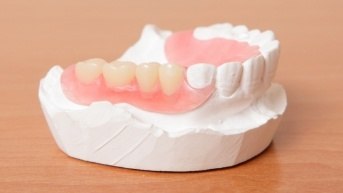
If you’ve lost several teeth but you still have a few healthy ones left, you may be a candidate for a partial denture. Having a large gap in your smile can make it difficult trying to eat, speak, or smile. Fortunately, we can take an impression of your mouth to recreate those you’ve lost. They are held in a gum-colored base that has a metal framework, so they can clip or clasp onto your natural teeth to hold it in place. Your prosthetic teeth are carefully crafted to match your real ones, so they blend in seamlessly when you smile.
Full Dentures
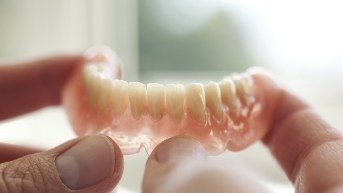
Although they have a bad reputation for looking and feeling fake, dentures now look and feel more realistic than ever. We take an impression of your mouth to create an acrylic base to hold your replacement teeth. The denture is held to your gum tissue using suction or an adhesive. You’ll regain your ability to chew, speak, and smile without any concern; however, if you’re interested in a more permanent solution, ask us how dental implants can stabilize your denture.
Dental Implant Dentures
If you prefer a more permanent solution for your tooth loss, implant dentures are an exceptional way to restore your smile. Their surgical placement into your jawbone and ability to fuse with the bone tissues creates a solid foundation for your customized restoration. Instead of relying on additional products (i.e., adhesives and special cleaning supplies) to keep your teeth healthy and in place, you can feel more at ease knowing that your implant dentures are not going anywhere. Not to mention, they look and feel just like regular teeth, so they’re easy to maintain.
How Dentures Are Made
If you’re thinking about getting dentures, you may be wondering what the process looks like. Understanding how they are made and what materials are used to create your artificial teeth will help you to appreciate your smile even more! Everyone’s treatment plan looks a little bit different, but here is what you can generally expect.
What Are Dentures Made Of?

Dentures are made up of two different parts – the base and the replacement teeth. Here’s a closer look at each of the components:
- Denture Base: This is the foundation of the denture. It supports the replacement teeth. It can be made from a variety of materials, including acrylic, nylon, porcelain, resin, or metal. Full dentures are generally made from acrylic because it can be tailored to match your natural gum tissue. Partial dentures may use metal clips with an acrylic base.
- Replacement Teeth: The artificial teeth are usually made from resin or porcelain because they both have a natural appearance. However, porcelain is most popular because it looks and feels like natural teeth. It’s also very durable. Because porcelain can be abrasive on the adjacent teeth, it’s usually only recommended for full dentures.
The Denture Creation Process
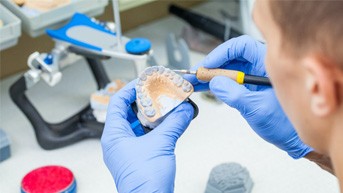
Dentures are customized for the patient’s mouth, so they require a multi-step process. Here is a step-by-step process of what this looks like:
- Step 1: Your dentist will begin by taking impressions of your upper and lower gums. This is used to create a plaster model that will act as a replica of your mouth. The model is used to make sure that the final denture is the right shape and size. Measurements of the jaw are also taken at this time.
- Step 2: The cast is then sent to the dental laboratory where the dentures will be crafted. The wax version of the gumline is created.
- Step 3: Artificial teeth are set into place. A mechanical device called an “articulator” is used to attach the teeth with wax. The technician will make minor adjustments by shaping and carving the wax to ensure that it looks like your gums. This wax base will be used for your finished dentures.
- Step 4: The wax dentures are sent to the dentist for a fitting. If approved, they are sent back to the dental lab to complete the process.
- Step 5: Once back at the lab, the technician will boil the dentures to get rid of the wax portions. To do this, the dentures are placed in a flask into which plaster is poured to maintain their shape. Then, the entire flask is placed into hot water to melt away the wax.
- Step 6: Holes are made in the teeth so the material can attach to them. A liquid separator is added to the plaster layer to stop the acrylic from sticking to it. Acrylic is then injected into the flask to replace the wax.
- Step 7: The plaster is carefully removed using special lab tools to reveal the denture. Then, the dentures are placed in an ultrasonic bath to remove any remaining plaster.
- Step 8: Excess acrylic will be cut from the denture. After trimming, the denture will be polished to perfection.
- Step 9: Now that it’s ready, the patient will return to the office for a fitting. Adjustments will be made as needed to ensure that everything works properly and smoothly.
Adjusting to Your New Dentures

It is normal for patients to feel some level of discomfort when they first get their dentures. Initially, you may experience mild soreness and have some difficulty speaking and eating. With time, the mouth will adjust to the dentures, and they should feel similar to natural teeth. You can speed up this adjustment process by sticking to soft foods, exercising your facial muscles, and experimenting with adhesive.
The Benefits of Dentures

Dentures in Burlington offer an array of benefits for your oral and overall well-being. In choosing these unique prosthetics, you will find they provide a way for you to feel more confident and comfortable around others, especially while speaking and eating. Here are several advantages you can expect to enjoy after renewing your smile with dentures.
Psychological Benefits
Missing some or all of your teeth can be incredibly difficult, both for your oral health and quality of life. Many people struggling with tooth loss can end up feeling less confident about their appearance, which can make them less willing to engage in social activities and more likely to experience sorrow and depression. With dentures, you can conveniently restore your bite with new pearly whites, allowing you to feel comfortable again showing off your beautiful grin. You’ll also be less worried about issues like chewing, speech, appearance, and more!
Clearer Enunciation
Talking becomes generally more difficult the fewer teeth you have. This is due to people usually using their tongue and lips to press against their teeth to pronounce certain sounds and words. Without all of your smile, enunciating properly can be more challenging. That’s why dentures offer an incredible natural-feeling solution for replacing your missing teeth, allowing you to speak more clearly again. You should expect a temporary adjustment period that can be quickened with practice and repetition.
Improves Nutrition
Some foods can be of tougher texture, making them harder to bite into, including healthier meals. To expand your diet, you can restore the majority of your bite with dentures. These prosthetics are lifelike and can help you regain your chewing ability, allowing you to eat fruits, vegetables, and lean meats that you otherwise wouldn’t have been able to enjoy before receiving your new teeth.
Preserves Oral Health
Some patients might still have some of their existing natural teeth intact. By wearing dentures, you can effectively reduce the chance of your remaining pearly whites shifting out of place. Additionally, your prosthetics can share the pressures of chewing, meaning you can prevent the wear and tear of your healthy teeth in the long run.
Expands Opportunities
Most people look at a person’s smile when first meeting them, making a complete bite one of the crucial ways to create an impression. For this reason, those who are missing teeth can benefit greatly from dentures. Not only will they get to enjoy improved oral health and easier daily habits, but they can also expand their social and professional opportunities with a full smile!
How Do I Take Care of a Denture?

Your denture can last for 5 to 7 years before needing to be replaced. You can promote how long your new smile lasts by taking the time to care for it:
- Clean it daily with mild hand soap or denture cleanser.
- Brush your denture with a non-abrasive toothpaste and soft-bristled toothbrush.
- Don’t forget to clean your gums and tongue.
- Soak your denture overnight.
- Visit your dentist in Burlington regularly.
Understanding the Cost of Dentures
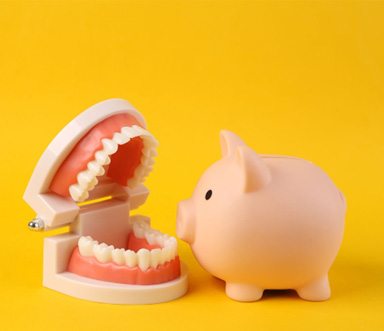
The more you learn about dentures, the more you are probably ready to get started with your plans for rebuilding your smile. Before you fully commit, however, it makes perfect sense you would be curious about the cost of dentures in Burlington. During your consultation, our team at Complete Dental Care will conduct an oral examination and explain which factors will affect the final price. Following the appointment, you’ll have a better understanding of what you can expect to pay for your treatment.
Factors That Affect the Cost of Dentures
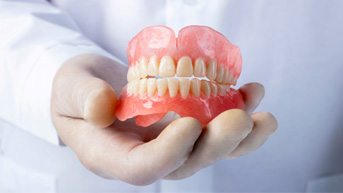
Multiple considerations can influence the price of dentures in Burlington including:
- The type of acrylic used for the base (part that is dyed to match color of gum tissue)
- The materials your denture will be made of (usually porcelain or acrylic)
- Any work needed beforehand like tooth extractions or periodontal therapy
- The number of teeth you’re missing
If cost is the top priority, you may be tempted to opt for cheaper dentures. Even though the upfront expense is certainly lower, they tend to break easily and require replacement much sooner than you’d expect. That’s why quality should always be of utmost importance, regardless of the cost.
Are Implant Dentures More Expensive?
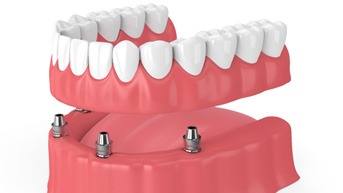
Yes, implant dentures are generally more expensive than traditional ones. However, there’s a good explanation for that. They require oral surgery and the placement of multiple dental implants, making them more reliable for everyday use since they do not shift out of place. Many patients discover this method of tooth replacement is well worth the investment because of several tremendous benefits. Not only do implants stimulate the jawbone, but they can last decades or even a lifetime with proper care and maintenance. That means you won’t have to worry about replacing your dentures nearly as often!
Does Dental Insurance Cover Dentures?

Dentures are considered a major procedure which is why most dental insurance plans will cover approximately 50 percent of their cost. Certainly, every policy is unique, meaning the amount of coverage provided will vary from patient to patient. If you have any questions about your plan, contact your insurance provider or ask our dental team for assistance. We will gladly review the details of your policy and do everything possible to maximize your benefits and reduce out-of-pocket expenses.
Other Options for Making Dentures Affordable

We understand not everyone has dental insurance which is why we offer additional financing options to make your dental bills much easier to manage. Here’s what is available to you:
- CareCredit Financing – With this option, you can split up the total cost of your treatment into smaller, budget-friendly monthly installments. Some options even come with little-to-no interest.
- In-House Savings Plan – With this annual option, you’ll get 15 percent off all dental procedures. Also included in the price are 3-4 cleanings, exams, digital X-rays, and fluoride treatments.
Ready to begin down the path to a beautiful, complete smile? Contact us today to schedule a consultation so your denture dentist in Burlington can answer any questions you might have.
Dentures Aftercare

Your new dentures can improve your smile’s appearance and functionality for 5 to 7+ years. However, that’s only if you care for them correctly. Even those with no natural teeth remaining should practice preventive measures, such as scheduling standard checkups every six months, to maintain their dental health.
For instance, regularly cleaning your mouth and attending routine appointments can help prevent common oral concerns, such as gum disease. Continue reading to learn how to maintain your restoration and preserve your oral health, and please don’t hesitate to contact us for additional information.
Removable Dentures
Remove After Eating
Your dentures return a portion of your original chewing power, so you can more easily bite and grind food for easier swallowing and digestion. This helps you enjoy a wider variety of wholesome ingredients to support your oral and overall well-being.
However, you should remove your restoration to rinse it under gently running water after meals to remove leftover food that attracts harmful, plaque-building bacteria. Be sure to use cool or lukewarm water, as hot temperatures can warp the acrylic base, making it no longer fit correctly.
Clean Your Restoration
You should also remove your dentures twice daily to thoroughly scrub all surfaces. To do so, brush them using a soft-bristle toothbrush and mild, unscented dish soap or a special cleanser that won’t abrade the materials.
You should also clean your connective tissues and rinse your teeth before placing them back into your mouth to avoid recontamination.
Keep Your Dentures Safe
These prosthetics can become quite slippery during cleanings, and unfortunately, they can be chipped, cracked, or broken if they fall from a great enough height or land on a hard surface.
You can prevent this by placing a soft towel or cushion beneath you when you wash them so they’re less likely to sustain damage if they fall from your fingertips. It’s also wise to store your dentures out of the reach of small children or pets who may not know how to handle them carefully.
Remove Dentures When You Sleep
You might think it’s safe to sleep with your dentures in your mouth, and while a single incident might not hurt you, it’s generally recommended that you take them out at night. This is because they form a tight bond against your gums to remain in place, which reduces the circulation to your connective tissues. This can rub sore spots into the tender tissues that can become infected and make it uncomfortable to wear your restoration. It can also increase the likelihood of developing periodontal issues, pneumonia, and other diseases.
Our team in Burlington recommends leaving your dentures in a glass of room-temperature water or in a specially designed soaking solution while you sleep. Not only does this give your gums a much-needed reprieve, but it also kills germs while maintaining the shape of your teeth.
Notice Changes
Paying attention to your own teeth and gums can help you recognize potential areas of concern with enough time to get help. For example, if your gums look darker or puffier than usual, you can contact our team for an exam and cleaning to prevent the progression of potential gum disease.
Our team can also repair injured or ill-fitted dentures, so there’s no need to try to fix them at home if they’ve been harmed. You might feel tempted to mend them with superglue or other household supplies, but these generally aren’t intended for oral use and can be toxic if ingested. Meanwhile, our team can professionally clean, reline, repair, or replace damaged dentures to preserve your smile.
Dentures Frequently Asked Questions

Do you still have questions about getting full or partial dentures in Burlington? When you visit our dental office for a consultation, we’ll provide you with all of the details you need to feel comfortable and confident restoring your smile. We’ve also collected some of the most common questions that we receive from our patients below. If you don’t see your concern addressed below, don’t hesitate to call us!
How long will my dentures last?
With routine maintenance, your dentures can last for anywhere between five and seven years before needing to be replaced. This is because your mouth will continue to change shape over the years, which can alter the way they fit. Here are some tips to help you get the most out of your restorations:
- Place a towel on the counter to set them on after you clean them to keep them from slipping and landing on the floor.
- Remove and rinse your dentures after each time you eat.
- Clean your gums and existing teeth after removing your dentures.
- Brush your dentures with a soft denture brush and denture cleaner every day.
- Soak your dentures overnight.
- Schedule semi-annual checkups and cleanings with Dr. Kostas.
Will dentures affect my diet?
Going from an incomplete set of teeth to a complete one will expand your nutrition options and allow you to eat more foods. However, there are certain foods that you’ll want to avoid eating with your restoration in, including:
- Large pieces of tough meat.
- Sticky foods.
- Hard foods.
- Foods that your teeth can’t easily grind, such as nuts.
If you’re in a position where you can’t really avoid eating these foods, you can still eat them, just be mindful and try to only eat them sparingly.
Can I sleep with my dentures in?
We don’t recommend sleeping with your dentures in your mouth, because it’s important to soak them every night while you sleep to allow them to maintain their shape (this doesn’t apply to partial dentures). The moisture keeps them from shrinking and incorrectly fitting in your mouth, which allows them to function properly and be more comfortable.
How do I use a denture adhesive?
If you’re using a denture adhesive cream, it’s important to clean and thoroughly dry your restorations before starting the process of applying them to your mouth. Place small dots or strips of adhesive on your dentures, making sure not to place them too close to the edge. Position your dentures firmly in place over your gums. If the adhesive oozes out, this is a sign that you’ve used too much. One application should be enough to last you through the entire day.
Schedule an Appointment Today!

You don’t need to live with an incomplete smile. We can replace your missing teeth with partials or dentures. Contact our dental office today to schedule your consultation.







